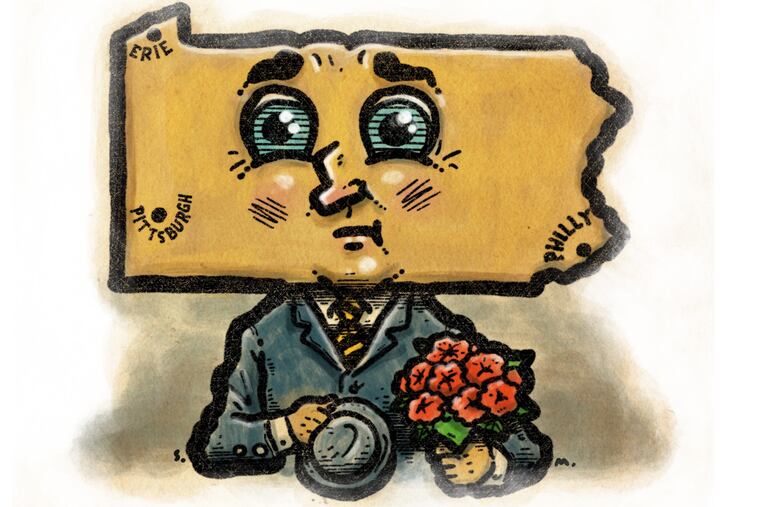Sorry, but no one apologizes like Pennsylvanians
One of the best apologies: “I take full responsibility for my mistake, and I’m truly sorry.”

They’re sorry in Pittsburgh, chagrined in Erie, and absolutely beside themselves here in Philly.
Earnest apologies, apparently, are Pennsylvania’s thing. In fact, the state ranks No. 1 for articulating the most sincere apologies in the United States, according to a recent national poll. It was commissioned by Preply, an online language-learning company.
Respondents were asked a series of questions that determined the wholeheartedness of their apologies. Answers were then weighed on a scale with a cumulative maximum score of 100. Pennsylvania came in at 97, just beating out the deeply remorseful residents of Iowa, at 95.
The most sincere apologies express genuine remorse, take responsibility, acknowledge wrongdoing, validate the offended party’s feelings without excuses, and even offer restitution when appropriate, according to the poll.
Examples of the best apologies include:
“I take full responsibility for my mistake, and I’m truly sorry.”
“I’m sorry for what I did to you, and I want to fix it.”
“I’m so sorry for what I did to you; it was inexcusable.”
Apologies that have little chance of inspiring forgiveness comprise anemic remarks like, “I apologize for any inconvenience I may have caused,” or — the lamest expression of regret on the planet — “I’m sorry you’re mad at me.”
The world has heard quite a number of clunky, poor apologies, noted Maurice Schweitzer, a professor of management and an expert on decision-making from the Wharton School of the University of Pennsylvania.
One of the worst was uttered after the BP Deepwater Horizon explosion and oil spill in the Gulf of Mexico in April 2010, when 11 people died and 17 were injured.
Rather than expressing contrition, Schweitzer said, “Anthony Hayward [the CEO of BP] announced, ‘Nobody wants this over with more than I do. I’d like my life back.’
“That was a very bad apology.”
While Pennsylvanians truly mean their apologies, they don’t toss them out with much frequency. In fact, Keystone State folks say “I’m sorry” just 2.7 times a day. Only seven states are more parsimonious with their mea culpas, chiefly California, clocking in at 2.1 apologies per day.
Polite Iowans lead the nation, chirping out nearly 5 daily apologies.
Does any of this make sense?
“Not at all,” said Marsha Cohen, 60, of Mount Airy, executive director of the van Ameringen Foundation, a nonprofit that funds programs offering mental-health services for people of limited means, based in New York.
“It never occurred to me that the location of citizens had any bearing on apologizing.”
Well, hold on, said Marlo Zoda-DelSordo, 51, a community-relations manager from Glenside: “Pennsylvania’s ranking may be based on the state’s Quaker roots of tolerance. In my head, I keep hearing a Philly accent saying, ‘I don’t [blanking] apologize a lot, but when I do, I [blanking] mean it.’ ”
The poll’s creators said that “each state holds unique cultures, traditions, and linguistic nuances,” which is why “the art of apologizing varies” from place to place.
Certainly, apologies at least sound frillier in the South, noted Edel Howlin, 42, a communications consultant, also from Glenside.
“When they apologize in places like Texas, where I lived, there was more of a charming, mannerly ‘Sorry, ma’am,’ feel to it,” she said. “It’s more ceremonial, with more floral language than a Philadelphia apology.”
Apology as ‘super power’
The poll emphasizes the importance of apologies. But not everyone is comfortable admitting error.
More than 25% of respondents said they struggle to apologize, while 20% said they’ve lost a relationship because they didn’t acknowledge mistakes or harsh words.
“There’s a strong resistance to saying, ‘I’m sorry,’ ” said Ellen Jovin, an author and nationally known language expert who co-owns the communication skills training firm, Syntaxis, in New York. “People think apologizing is a weakness, but it’s a communication super power and a sign of human strength.”
Apologies possess a kind of muscularity that can allow a person to redress years-old sins or gaffes, Jovin said.
“I think people underestimate how much effect they have on someone’s life if they apologize for something that happened in the past,” she added. “Maybe you teased someone and recognize in hindsight that you hurt the person. You might think they forgot, but in my view, they probably never did.”
The poll seems to underscore that idea: Around 46% of Americans say they’re waiting for an apology from someone in their life.
Jovin recommends using the holiday season to email a heartfelt apology to a person you may have wounded decades ago. “‘I want to talk to you about something that happened when we were 16,’ you write. It can be life-changing.”
That very thing recently happened to Nathan Baynes, 46, of Mount Airy, owner of a food truck called 2 street sammies.
He received an out-of-nowhere email from a formerly close childhood friend who had begun to bully Baynes in high school, thus ending the friendship.
“It was nice to get a sincere apology after 30 years,” Baynes said. “He told me that he respected and appreciated me.
“It was a good feeling.”